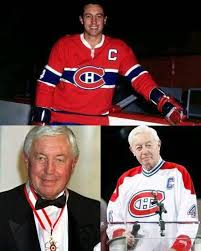Jean Béliveau: A Legacy Immortalized in Film
Jean Béliveau, affectionately known as “Le Gros Bill,” stands as a towering figure in the annals of hockey history. A recent Netflix documentary aims to chronicle his illustrious life and career, offering fans and newcomers alike an in-depth look at the man who became synonymous with the Montreal Canadiens.
Early Life and Entry into Hockey
Born on August 31, 1931, in Trois-Rivières, Quebec, Béliveau’s journey to hockey stardom began in the small town of Victoriaville. Raised in a family that valued discipline and hard work, he quickly showcased his athletic prowess. Before committing to hockey full-time, Béliveau was also an accomplished baseball player, even receiving a minor league offer at the age of 15. However, his passion for hockey prevailed, leading him to join the junior Victoriaville Tigres and later the Quebec Citadelles, where he honed his skills and caught the attention of NHL scouts.
NHL Career with the Montreal Canadiens
Béliveau’s professional debut with the Montreal Canadiens in 1953 marked the beginning of a legendary career. Standing 6’3″ and weighing 205 pounds, he was an imposing figure on the ice. His combination of size, speed, and skill made him a formidable center. Over 18 seasons with the Canadiens, Béliveau amassed 507 goals and 712 assists, totaling 1,219 points in 1,125 regular-season games. He also excelled in the postseason, recording 79 goals and 97 assists in 162 playoff games, making him the all-time leading scorer in Stanley Cup history at the time
His leadership qualities were evident when he was named team captain in 1961, a position he held for the remainder of his playing career. Under his captaincy, the Canadiens secured five Stanley Cups. Béliveau’s on-ice accomplishments include two Hart Trophies (1956, 1964), an Art Ross Trophy (1956), and the inaugural Conn Smythe Trophy as playoff MVP in 1965.
Post-Retirement and Contributions to Hockey
After retiring in 1971, Béliveau transitioned into an executive role with the Canadiens, contributing to the team’s success both on and off the ice. His influence extended beyond the rink; he was instrumental in promoting the sport and serving as a role model for aspiring athletes. In 1972, he was inducted into the Hockey Hall of Fame, with the standard three-year waiting period waived in recognition of his exceptional career.
Béliveau’s commitment to community service was evident through the Jean Béliveau Foundation, established in 1971 to support underprivileged children. The foundation distributed over $1.5 million over two decades, reflecting his dedication to giving back. In 1993, the foundation was transferred to the Quebec Society for Crippled Children, continuing his legacy of philanthrop
The Netflix Documentary
The upcoming Netflix documentary seeks to encapsulate Béliveau’s multifaceted life. Through archival footage, interviews with former teammates, and insights from sports historians, the film promises to provide a comprehensive portrait of a man who transcended the sport. While specific release details remain forthcoming, the documentary aims to highlight not only his athletic achievements but also his character, leadership, and lasting impact on the hockey community.
Legacy and Enduring Influence
Jean Béliveau’s legacy endures through various tributes and honors. The Montreal Canadiens retired his No. 4 jersey in 1971, ensuring his place in the team’s storied history. In 1998, he was made a Companion of the Order of Canada, the country’s highest civilian honor, recognizing his contributions to the sport and society. Additionally, Béliveau’s name was added to Canada’s Walk of Fame in 2001, further cementing his status as a national icon.
The forthcoming Netflix documentary serves as a testament to his enduring influence, offering a new generation the opportunity to learn about a man who embodied grace, skill, and leadership both on and off the ice. As fans and newcomers alike await its release, Jean Béliveau’s story continues to inspire and resonate, reminding us of the profound impact one individual can have on a sport and a na

